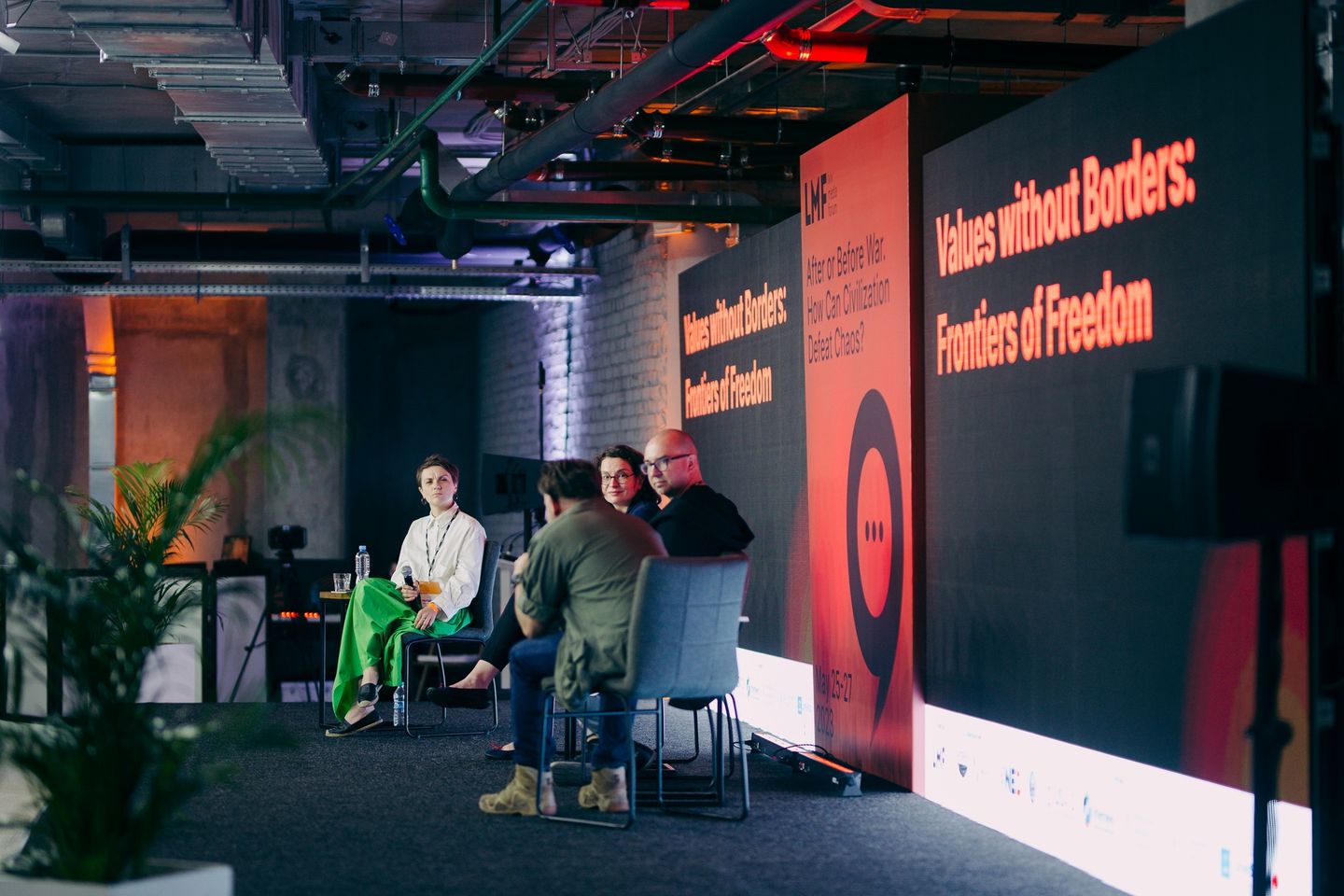During the 2023 Lviv Media Forum, amid the backdrop of an ongoing war, historian Franziska Davies (Ludwig Maximilian University of Munich), photojournalist Christopher Occhicone (Wall Street Journal, Bloomberg News, and Stern), and philosopher Volodymyr Yermolenko (Pen Ukraine) discussed the values that define modern-day Ukraine. The country’s distinct identity is rooted in the repulsion of violence, love for the land, and a warrior ethos. The struggle for dignity and the fight against colonialism and imperialism have shaped Ukraine’s character, proving that societies and people have the power to effect change.
Repulsion of violence
Volodymyr Yermolenko: When we talk about in which way Ukraine is different from Russia, I would not only talk about freedom but also about the attitude to violence. I was born in 1980 and what I see is increasingly less tolerance to all sorts of violence — though that doesn’t mean we have progressed to an ideal state. I do think that totalitarian regimes – and Russia is an heir of totalitarian regimes – are the fabric of society built upon this verticality of violence. You either suffer from violence or exert violence.
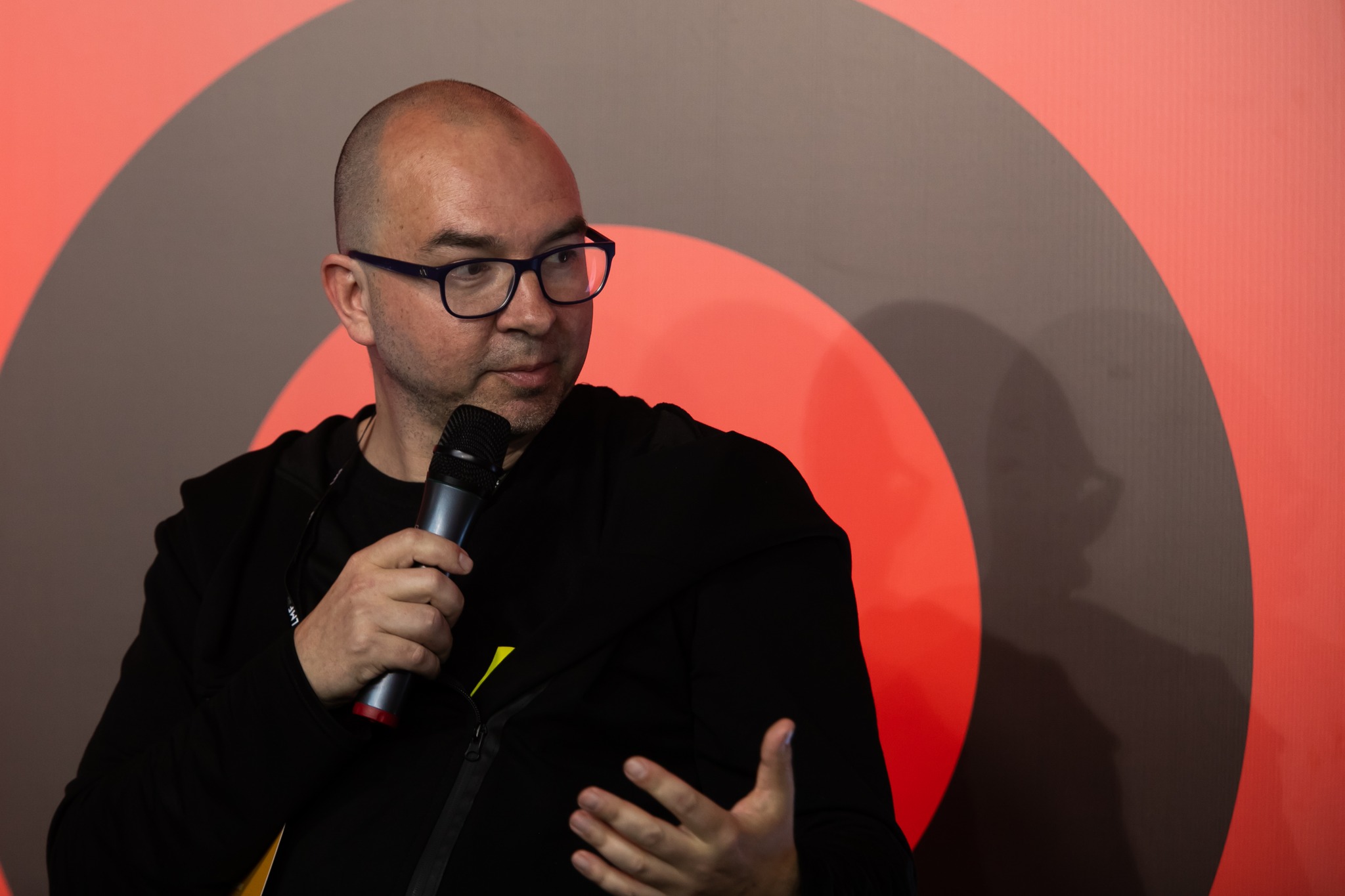
I don’t think it’s a linear process, and the remnants of the past still exist here. However, I do think that Ukraine is moving in the direction that violence should not be a principle of organizing society.
For me personally, this was the key sentiment of Euromaidan [Revolution of Dignity 2014]. I believe that Euromaidan was ideologically very different. It was liberal, it was leftist, it was conservative – whatever else – but an idea that unified it was this repulsion of violence.
“Leave us alone” and love to earth
Christopher Occhicone: I came to Ukraine in 2014 as a freelance photographer and spent a month with the Battalion Donbas near Ilovaisk. It was madness. After this experience, I thought I understood what soldiers were fighting for. Then, and afterward when working in Ukraine, I was mostly hanging out with the soldiers I’d been photographing – Right Sector [a civic movement that brought together activists from Ukrainian nationalist organizations]. So maybe my impression of the overall country is somehow influenced by that. I often say that those soldiers are better Americans than most Americans. But in fact, what does it mean to be American? What unites me and an American colleague of mine? I would say it’s a fierce independence and that’s it. And Ukrainians, I think, just want to be left alone.
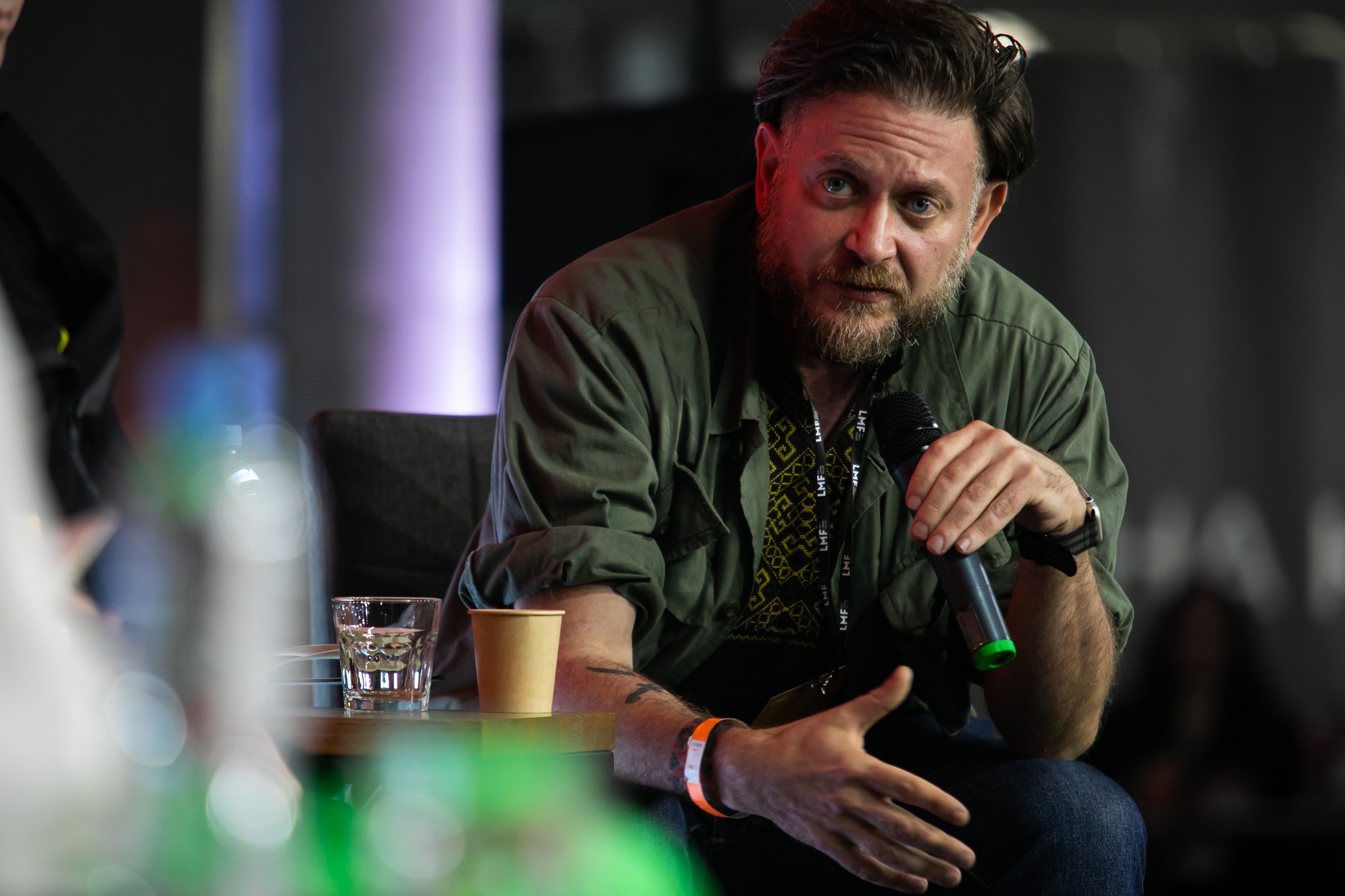
I always joke with my girlfriend (she’s from Kyiv and I’m from New York City) that her town is a big village. But probably the most important value I learned from all my time with soldiers on the front line is that it’s a big village where there is a strong connection to the land. I know people who are working in IT or construction in Kyiv – from intellectuals to regular workers – and they go to their parents’ village to pick potatoes. They put their hands in the earth.
My best friend is fighting now. We met when he was a camera operator in Illovaysk on the first day [of the full-scale invasion, 24 February 2022]. We were together at five o’clock in the morning, looking out the window of the Hyatt hotel, and saw the first rocket hit. He had been saying this was going to happen, and I couldn’t believe my eyes. He said to me something like, “My biggest fear is that my family lives in a village near Desna. I can see my ancestors’ graves dating as far back as the 1700s. What if [the Russians] make it to that side of the Dnipro and I can’t go there.” That was the biggest fear.
I’ve been spending months with the Fifth Assault Battalion near Bakhmut, and when we talked about (which is rare) what you want after the war, most of them have a very similar answer – “I want to go to my village and go fishing with my wife and kids.” I think the biggest shared value is, “I want to be left alone.”
Volodymyr Yermolenko: I want to develop the story about earth. When we [PEN Ukraine] came to temporary housing in Borodianka — built for those people who survived after bombings of the multi-story building that everybody knows — there was almost nobody. We asked why, and others answered, “Oh, they went to cultivate the earth.”
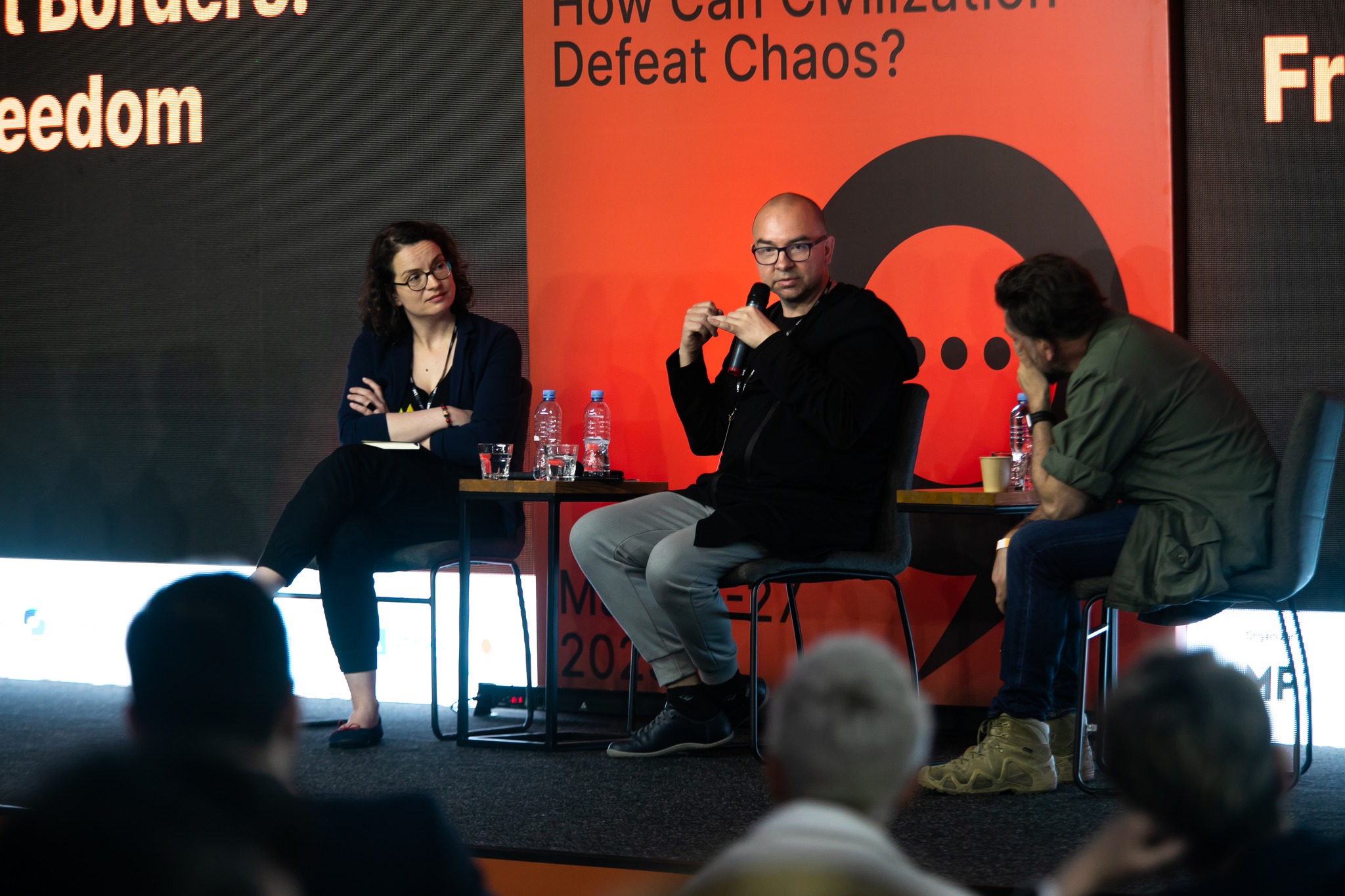
In the villages around Kyiv, for example, in Moshchun, we were passing through two absolutely destroyed houses of one family. People were working on the land behind the house. They were offering us cucumbers as a gift.
Another story was in Izium, next to the five-story buildings with very tragic and painful stories. We were talking to a man who lost seven members of his family in two seconds, when suddenly we saw a man walking down the road with his fishing gear. He had come back to Izium [after its de-occupation] and he just decided to go fishing.
It’s a question of roots as well. Human beings are also plants – there is a certain botanic element in human beings that makes us want to be rooted. This is a big thing with Ukrainians. I mean Ukrainian culture is all about botanics, plants, flowers, animals, etc. That’s very interesting, because you can’t really explain this to the mostly post-national liberal society who say, “Why the hell do you need earth?”
Even our parents, who are a first-generation of urbanization (people moving from villages to cities where they become russophone, even though they spoke Ukrainian in their villages). In the cities, they started to build houses and dachas, but they continued to garden and plant. Not because they wanted a comfortable spot to rest, but because they needed to have direct contact with the earth.
Sometimes, this need can seem to distinguish us from our German or American friends, where derootedness, I think, is much wider. People in Ukraine have internalized the knowledge that you cannot literally survive without your piece of land. And – as a broader metaphor – without your country, without your state.
Franziska Davies: My hypothesis is that this [love for the earth] is also about the experience of deportations, which is a structural feature of Soviet history. De-rooting people, taking them away from where they were born and then afterwards letting them return to where they actually came from, might be one of the factors explaining this close connection [to the earth].

Warrior ethos
Christopher Occhicone: When talking about Ukrainian culture, those on the frontline identify probably mostly as Cossack. Meanwhile, politically they are closest to libertarian. Today, there’s only one question – how to get weapons. Because without arming these soldiers and supporting them, everybody’s just driving around in dung. I would say that not just these soldiers, but all Ukrainians, are a country of warriors. And that’s probably the greatest value I can think of.
Volodymyr Yermolenko: In Germany, after the Second World War, the idea that you should avoid evil, rather than confront evil, has won. Because if you confront evil, if you say I will be a warrior who will fight against evil, you will be suspected of going to far-right rhetoric. So, the problem of the European discourse is that the idea of fight – what I would call warrior ethos – was assimilated with ideas of far-right and nazism. This was a huge mistake, and therefore, since 2014, we have seen this very long discourse to understand Ukrainians.
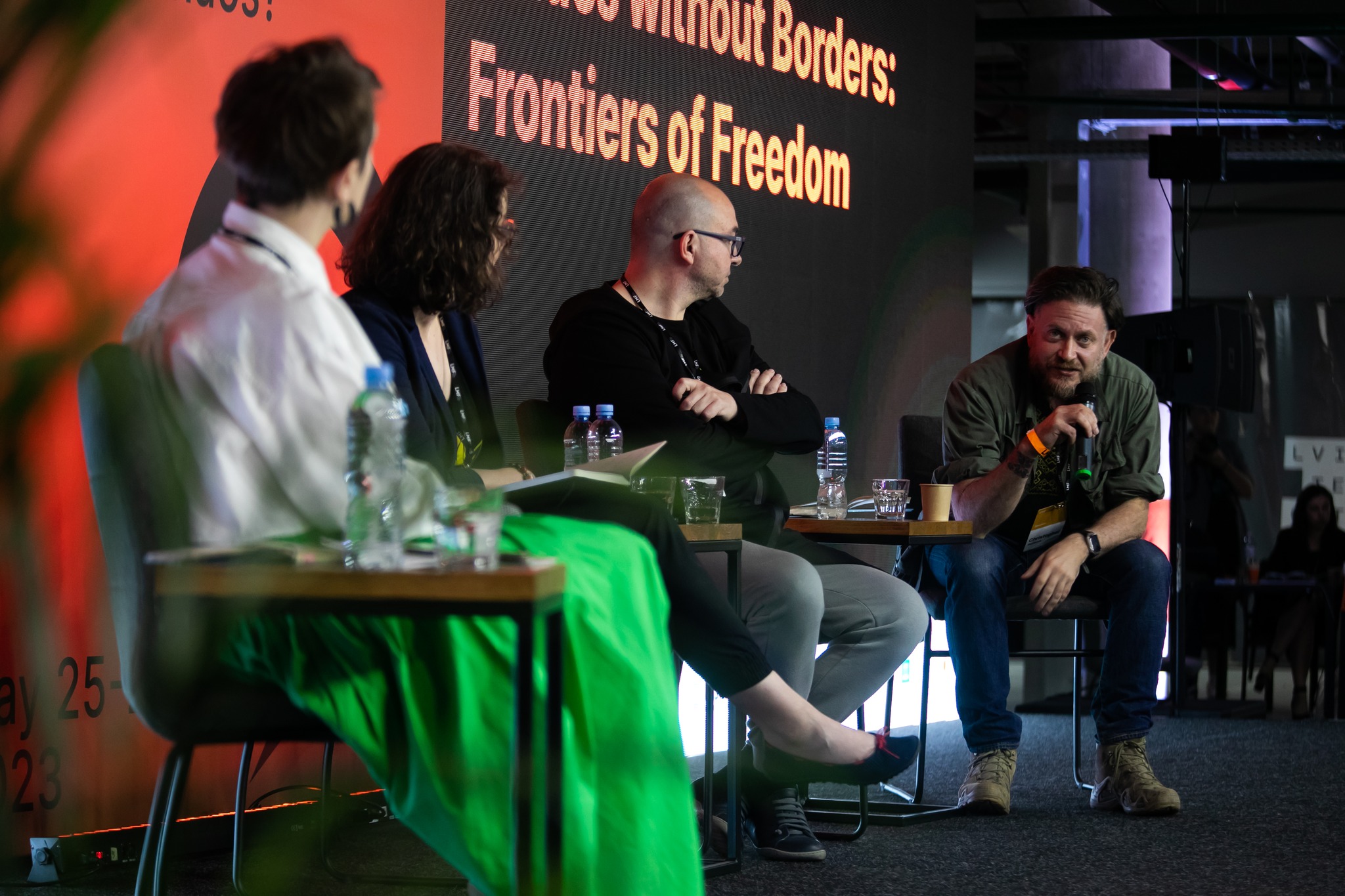
Balancing tradition in modernity
Volodymyr Yermolenko: The world now really has breaches — trenches between two sets of ideas. One is progressive/liberal and the other is traditional/conservative. We see these splits almost everywhere. We see that Russia clearly has it and chooses the so-called traditional/conservative agenda, which I think is fraudulent and not a real conservative agenda.
We see Poland split, we see America split, we see Britain split because of Brexit, etc. Either you’re saying you’re radically progressive, radically liberal, or you’re saying that you’re radically conservative.
I think this is wrong. One of the things that is going on in the Western world is radicalization of these sets of values. I believe there is some way for Ukrainians to find the balance between them, because, in the past decades, one of our precepts for organizing society is balancing tradition with modernity.
If we go deeper into the past, if we go to our art, our culture, our modernist writers, our avantguard, we are always going to the future but also reinventing the past. I believe it is important to think that we actually can avoid these splits, which are splitting many different countries.
Anti-imperial fight for freedom
Franziska Davies: This war is anti-colonial and anti-imperial. It is against the vision of the world envisaged by Russia today, namely, that so-called small nations – who are not actually small nations – don’t have the right to exist or to decide their own fate. Thereby, people and societies do not have this right either.
I think these are the very kinds of core values that Ukraine has been fighting for and misunderstood in many European countries. The lack of empathy in Germany became very visible during Maidan. I think there’s some general trend when you’re too rich and too well-off to actually understand how privileged you are.

In English, the German concept of this attitude could be translated as “affluent neglect.” Many Germans did not understand the fight for freedom during Maidan — they saw this as a struggle between East and West. Ukraine didn’t have any agency for them. The 2014 Revolution of Dignity in Ukraine is described in the German Wikipedia as the “Ukrainian crisis.”
Ukrainians were fighting for something that at least Western Germans had actually just received – democracy and freedom of speech. It was given after they had waged a genocidal war against the peoples of Eastern Europe — after they had themselves launched a colonial war of annihilation against them.
Germany had never experienced that. There are moments in history when you risk your very life to live in dignity. Germans saw Maidan as [Ukrainians] desire for more consumer goods and travelling to the West. They saw Maidan in terms of East and West. And they were absurdly obsessed with idea of Ukrainians being nationalists.
This completely contrasted with Poland, where I was living during the full-scale invasion. Polish society understood Ukraine, because they have the historical experience of being oppressed by an imperial power. The Poles were admiring the resistance of the Ukrainians, while the German intellectuals were fantasizing about an uneasiness with the narrative of Ukrainian heroism. They were in such a privileged position that they had a complete lack of empathy for what was actually happening. Germans had never known the experience of occupation, nor had they ever experienced a successful fight against an imperial aggressor for their freedom and independence.
Germans has looked very critically at their own past but there’s still no understanding that the Second World War was also a war of colonialism against the people of Eastern Europe. There is very little reckoning with the shared German and Russian imperialism at the expense of the people of Eastern and Central Europe.

In many discussions I have had with people in the last years — and especially in the last 15 months — were like this. When a person said to me, “Well, I’m more interested in saving lives than you, because you want to send German weapons to Ukraine. You are more interested in saving borders.” And I said, “I am interested in protecting borders because borders save human lives.” This is an example of where there is still a lack of understanding.
Dignity
Volodymyr Yermolenko: An important value for Ukrainians is dignity. The word dignity is one that we all know, but most often do not define. It’s very difficult, because in the legal field, dignity is very rarely defined. But if you look back at this word, which comes from the Roman era, it has nothing to do with human rights. It rather has to do with the idea that the Roman patricians had some achievement in their life that they would never give back.
It is the idea that there is something you hold that you will never give back. You would rather die than give it back. Hence is the whole idea of European civilization. An important question is how we expand the space for dignity and how we reduce the space for violence.
I think this is a never ending process. In particular, because of such a paradox as “liberal racism” in the late 19th century. The story of the 21st century is how we not only expand this space of dignity for all human beings, but also beyond human beings.
Franziska Davies: Ukraine is an example that societies and people can change something. Very often, even in democracies – or particularly in democracies – and, of course, in authoritarian states, people have this cynical idea that it doesn’t matter what we do, things do not change. I think Ukraine is a very powerful counter-example.

